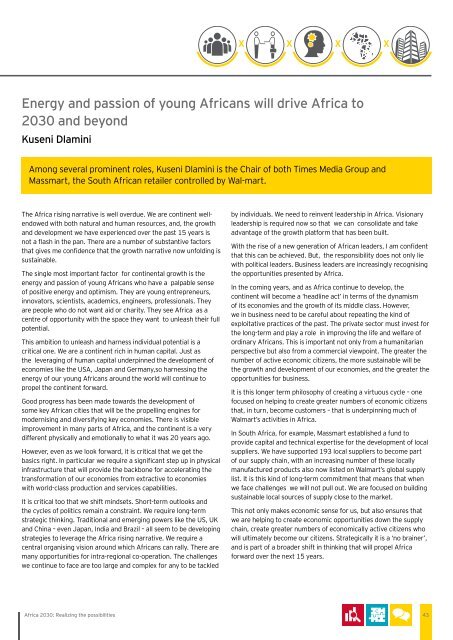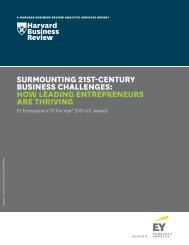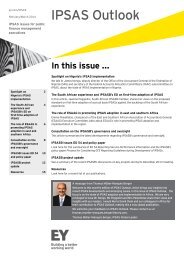You also want an ePaper? Increase the reach of your titles
YUMPU automatically turns print PDFs into web optimized ePapers that Google loves.
Energy and passion of young Africans will drive Africa to2030 and beyondKuseni DlaminiAmong several prominent roles, Kuseni Dlamini is the Chair of both Times Media Group andMassmart, the South African retailer controlled by Wal-mart.The Africa rising narrative is well overdue. We are continent wellendowedwith both natural and human resources, and, the growthand development we have experienced over the past 15 years isnot a flash in the pan. There are a number of substantive factorsthat gives me confidence that the growth narrative now unfolding issustainable.The single most important factor for continental growth is theenergy and passion of young Africans who have a palpable senseof positive energy and optimism. They are young entrepreneurs,innovators, scientists, academics, engineers, professionals. Theyare people who do not want aid or charity. They see Africa as acentre of opportunity with the space they want to unleash their fullpotential.This ambition to unleash and harness individual potential is acritical one. We are a continent rich in human capital. Just asthe leveraging of human capital underpinned the development ofeconomies like the USA, Japan and Germany,so harnessing theenergy of our young Africans around the world will continue topropel the continent forward.Good progress has been made towards the development ofsome key African cities that will be the propelling engines formodernising and diversifying key economies. There is visibleimprovement in many parts of Africa, and the continent is a verydifferent physically and emotionally to what it was 20 years ago.However, even as we look forward, it is critical that we get thebasics right. In particular we require a significant step up in physicalinfrastructure that will provide the backbone for accelerating thetransformation of our economies from extractive to economieswith world-class production and services capabilities.It is critical too that we shift mindsets. Short-term outlooks andthe cycles of politics remain a constraint. We require long-termstrategic thinking. Traditional and emerging powers like the US, UKand China – even Japan, India and Brazil – all seem to be developingstrategies to leverage the Africa rising narrative. We require acentral organising vision around which Africans can rally. There aremany opportunities for intra-regional co-operation. The challengeswe continue to face are too large and complex for any to be tackledby individuals. We need to reinvent leadership in Africa. Visionaryleadership is required now so that we can consolidate and takeadvantage of the growth platform that has been built.With the rise of a new generation of African leaders, I am confidentthat this can be achieved. But, the responsibility does not only liewith political leaders. Business leaders are increasingly recognisingthe opportunities presented by Africa.In the coming years, and as Africa continue to develop, thecontinent will become a ‘headline act’ in terms of the dynamismof its economies and the growth of its middle class. However,we in business need to be careful about repeating the kind ofexploitative practices of the past. The private sector must invest forthe long-term and play a role in improving the life and welfare ofordinary Africans. This is important not only from a humanitarianperspective but also from a commercial viewpoint. The greater thenumber of active economic citizens, the more sustainable will bethe growth and development of our economies, and the greater theopportunities for business.It is this longer term philosophy of creating a virtuous cycle – onefocused on helping to create greater numbers of economic citizensthat, in turn, become customers – that is underpinning much ofWalmart’s activities in Africa.In South Africa, for example, Massmart established a fund toprovide capital and technical expertise for the development of localsuppliers. We have supported 193 local suppliers to become partof our supply chain, with an increasing number of these locallymanufactured products also now listed on Walmart’s global supplylist. It is this kind of long-term commitment that means that whenwe face challenges we will not pull out. We are focused on buildingsustainable local sources of supply close to the market.This not only makes economic sense for us, but also ensures thatwe are helping to create economic opportunities down the supplychain, create greater numbers of economically active citizens whowill ultimately become our citizens. Strategically it is a ‘no brainer’,and is part of a broader shift in thinking that will propel Africaforward over the next 15 years.Africa 2030: Realizing the possibilities43





